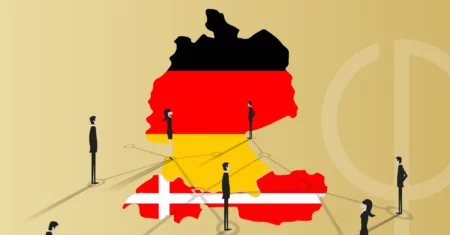Navigating Legal and Regulatory Challenges for E-commerce in the DACH Region
Written by
Kinga EdwardsPublished on

Our world is globalized, bound with ties of international trade and investment, international relations, and mass media. In the same vein, this globalized world is broken into various regions with their own specifics and dynamics that run with existing laws and regulations. The DACH region is among the most lucrative ones.
The DACH region is one of the most advanced in the world. Its strong economy and high standard of living greatly reflect on the booming e-commerce industry there.
With this article, the UAWC marketing agency aims to outline the key legal and regulatory challenges to keep in mind when expanding your eCommerce business to this region.
What is DACH?

DACH is an abbreviation that stands for three central European countries: D — Deutschland (Germany), A — Austria, and CH — Confœderatio Helvetica (Switzerland). Therefore, it refers to German speaking countries. It is one of Europe’s economic powerhouses with its massive population of almost 100 million and cities like Vienna, Salzburg, Zurich, Geneva, Munich, Cologne, and Berlin.
The consolidated volume of this region’s online sales to business or consumer customers exceeded 90 billion euros in 2022. This is a record higher than any other language area in Europe.
However, with great success come great challenges. The DACH countries have a complex legal and regulatory environment, with different laws and regulations governing eCommerce businesses in each country. This can make it difficult for e-commerce businesses to navigate and ensure compliance, particularly when operating in multiple countries.
It is essential for e-commerce businesses to understand and comply with laws and regulations to avoid penalties, legal issues, and reputational damage. For example, ensuring SOC 2 compliance.
Non-compliance with data protection regulations can result in hefty fines, while non-compliance with consumer protection laws can lead to costly legal disputes and damage to the business’s reputation. Compliance with tax regulations is also essential to avoid tax penalties and legal issues that can harm the business’s financial stability.
Overview of Legal and Regulatory Framework in the DACH Region

Each country in the DACH region has its own unique legal and regulatory framework, but they are generally similar in many respects. For one, they all speak the German language, albeit with different dialects.
Many of their laws and regulations are also quite similar. Here are some of the most important ones:
Data Protection and Privacy Laws
The DACH region has strict data protection regulations, such as the General Data Protection Regulation (GDPR), that e-commerce businesses must comply with to protect customers’ personal data online.
Here is a run-down of the key laws and regulations that e-commerce businesses in the DACH region need to comply with:
- General Data Protection Regulation (GDPR): The GDPR is a comprehensive data protection regulation that applies to all European Union (EU) companies, including e-commerce businesses. The GDPR requires e-commerce businesses to obtain explicit consent from customers to collect and process their personal data and to implement technical and organizational measures to protect customers’ personal data
- German Federal Data Protection Act (BDSG): The BDSG is the national German law that supplements the GDPR. The BDSG regulates the processing of personal data by German online retailers. German data protection act requires businesses operating in the German market to appoint a data protection officer (DPO) if they process large amounts of personal data.
- Austrian Data Protection Act (DSG): The DSG is Austria’s national data protection law, which also supplements the GDPR. The DSG regulates the processing of personal data by e-commerce businesses in Austria and requires businesses to appoint a DPO if they process large amounts of personal data.
- Swiss Federal Act on Data Protection (FADP): The FADP is the national data protection law in Switzerland, which regulates the processing of personal data by e-commerce businesses in Switzerland. The FADP is not identical to the GDPR, but it provides similar protections for personal data and imposes similar obligations on e-commerce businesses.
- E-Privacy Regulation: The E-Privacy Regulation is a proposed regulation that is intended to replace the current ePrivacy Directive. The E-Privacy Regulation will supplement the GDPR and set out specific rules for protecting personal data in the context of electronic communications, including e-commerce.
Consumer Protection Laws

E-commerce businesses operating in the DACH region must comply with consumer protection laws that require clear and transparent communication of prices, delivery times, and return policies. These laws give consumers legal rights and protections against unfair business practices, including false advertising, misleading claims, and unfair pricing. In the DACH region, consumer protection laws are often implemented at the national level and may vary between countries.
Some of the regulations that deal with consumer protection are:
- Distance Selling Regulations: Distance selling regulations apply to e-commerce businesses that sell goods or services to consumers remotely, such as through a website or mobile application. These regulations require e-commerce businesses to provide clear information about the product or service, the price, and the delivery terms and provide Austrian, Swiss, and German online shoppers with the right to cancel their orders within a certain period.
- Product Safety Regulations: Product safety regulations aim to ensure that products sold to consumers are safe and meet relevant safety standards. These regulations may require businesses to carry out product testing, provide clear product warnings and instructions, and recall products that are found to be unsafe.
- Consumer Contracts Regulations: Consumer contract regulations aim to ensure that contracts between businesses and consumers are fair and transparent. These regulations may require businesses to provide clear information about the contract terms, including any fees, charges, or cancellation terms, and to provide consumers with a right to cancel the contract within a certain period.
Tax Laws

E-commerce businesses must comply with tax regulations in the DACH region, which can be complex due to differences in VAT rates, tax laws, and regulations across countries. Here is an overview of the key regulations related to VAT and other taxes that e-commerce businesses in the DACH region need to follow:
- Value-Added Tax (VAT): VAT is a tax on the value added to goods and services at each stage of production and distribution. E-commerce businesses selling goods or services in the DACH region may need to register for VAT in each country where they have customers. The VAT rates vary between countries and between different categories of goods and services.
- Import VAT: If e-commerce businesses import goods into the DACH region from outside the EU, they may be subject to import VAT, which is calculated on the value of the goods plus any customs duties and other charges. The import VAT rate is the same as the standard VAT rate in each country.
- Digital Services Tax: The Digital Services Tax (DST) is a tax on revenues generated from certain digital services, such as online advertising and the sale of user data. The DST is being introduced in several countries in the DACH region and is expected to be introduced in others.
- Corporate Income Tax: E-commerce businesses operating in the DACH region may be subject to corporate income tax on their profits. The tax rates vary between countries and depend on the business’s legal structure.
- Withholding Tax: Withholding tax is a tax on income that is withheld at the source, such as from dividends or interest payments. E-commerce businesses may be subject to withholding tax if they have operations or investments in the DACH region.
Key Legal and Regulatory Challenges for E-commerce Businesses in the DACH Region

E-commerce businesses face several specific challenges when operating in the DACH region. From our experience of working with businesses in this region, the most important ones to consider are:
VAT Compliance
Complying with tax regulations in the DACH region can be complex due to differences in VAT rates, tax laws, and regulations across countries. Thus, e-commerce businesses selling goods or services within the DACH region must register for VAT in each country where they have customers. They must charge the appropriate VAT rate on their sales, collect the VAT from customers, and pay the VAT to the relevant tax authorities. E-commerce businesses must also comply with other VAT regulations, such as issuing VAT invoices and filing regular VAT returns.
E-commerce businesses selling goods or services outside the DACH region must determine whether they need to charge VAT on their sales. If the customer is based in a country outside the EU, the sale is typically considered an export and is therefore exempt from VAT. However, if the customer is based in an EU country, the sale may be subject to VAT, and the e-commerce business must comply with the relevant VAT regulations in that country.
You should also be aware of the VAT registration threshold in each country where your business has customers. If your sales in a particular country do not exceed the VAT registration threshold, you may not be required to register for VAT in that country. To ensure VAT compliance, e-commerce businesses should maintain accurate records of their sales and purchases and keep track of their VAT liabilities in each country where they have customers. They should also seek advice from tax professionals to ensure that they are complying with all relevant VAT regulations.
Data Privacy Regulations
The DACH region has strict data protection regulations that e-commerce businesses must comply with to protect customers’ personal data. E-commerce businesses operating in the DACH region must comply with the General Data Protection Regulation (GDPR), a set of EU regulations governing personal data collection, processing, and storage. They must obtain consent from customers before collecting and using their personal data. They must give customers access to their data and the right to delete it.
These businesses must also enter into data processing agreements with any third-party service providers that process personal data on their behalf. These agreements must include provisions that require the service provider to comply with all applicable data protection regulations.
E-commerce businesses must ensure that they store customer data securely and protect it from unauthorized access or disclosure. This includes implementing appropriate technical and organizational measures to safeguard customer data. They must also comply with regulations related to cross-border data transfers and online dispute systems.
For example, if you transfer customer data outside the EU, you must ensure that the country to which the data is transferred provides adequate data protection.
Also, a comprehensive privacy policy must outline how you collect, use, and protect customer data. The privacy policy must be easily accessible to customers and should be written in clear and understandable language. You should also have procedures for notifying customers and authorities in case of a data breach.
Consumer Protection Laws
E-commerce businesses operating in the DACH region must comply with consumer protection laws that require them to offer refunds for defective or unsatisfactory products. Under these laws, customers have the right to return a product within a specified timeframe (usually 14 days) and receive a full refund. They must clearly state their refund policy on their website and provide customers with clear instructions on returning a product.
They must also comply with regulations related to returns. In the DACH region, these regulations typically require e-commerce businesses to cover the cost of return shipping for defective or unsatisfactory products.
E-commerce businesses must also comply with regulations related to product liability. These regulations require e-commerce businesses to ensure that their products are safe and meet all relevant safety standards. If a product is defective and causes harm to a customer, the e-commerce business may be held liable for damages.
It is also important to comply with regulations related to product labeling. These regulations require e-commerce businesses to provide customers with accurate and clear information about their products, including the product’s ingredients, country of origin, and any relevant safety warnings. They must provide customers with a warranty for their products that meets the legal requirements of the country in which they are operating. The warranty must include clear information on what is covered, how long the warranty lasts, and how customers can make a claim.
Strategies for Navigating Legal and Regulatory Challenges in the DACH Region
There are several strategies that e-commerce businesses can use to ensure compliance with relevant laws and regulations when operating in the DACH region. Some of them are discussed herein;
Conduct a compliance audit
E-commerce businesses should conduct a compliance audit to identify each country’s applicable laws and regulations and assess their compliance status. This can help businesses identify gaps in their compliance program and develop an action plan to address any issues.
The first step is to identify and review all applicable laws and regulations that the e-commerce business must comply with. This can include data protection laws, consumer protection laws, tax regulations, and more.
Then, they should assess their current compliance practices and policies against the identified laws and regulations. This can include reviewing their website and checkout process, data protection policies, refund and return policies and more. Based on the assessment, e-commerce businesses should identify any compliance gaps or areas where they are not meeting legal and regulatory requirements.
Once the compliance gaps have been identified, an action plan should be developed to address the gaps and ensure compliance. This can include updating policies and procedures, implementing new processes or technologies, or providing training to employees.
Finally, it is important to regularly monitor and review your compliance practices to ensure ongoing compliance with laws and regulations. This can include conducting periodic legal audits or consulting with legal and tax experts to stay current with laws and regulations changes.
Appoint a data protection officer
Under the GDPR, e-commerce businesses that process large amounts of personal data must appoint a DPO to oversee data protection compliance. A DPO can help e-commerce businesses navigate the complex data protection regulations in the DACH region and ensure compliance with the GDPR.
Partner with local experts
Partnering with local legal and tax experts is a great way for e-commerce businesses to ensure compliance in the DACH region. E-commerce businesses should research and identify reputable local legal and tax experts in the DACH region. This can be done through online searches, professional associations, and referrals.
Also, they should engage with the identified experts and explain their business operations, the products and services offered, and the countries they operate in.
Keep up-to-date with regulations
E-commerce businesses should stay updated with regulatory changes and developments in the DACH region to ensure ongoing compliance. This can include monitoring regulatory websites and industry publications and engaging with legal counsel or compliance professionals as needed.
You can subscribe to newsletters and updates from legal and regulatory bodies to stay informed about changes in laws and regulations. For example, there are newsletters from organizations like the Federal Ministry of Justice and Consumer Protection or the Federal Data Protection Commissioner.
You can also follow industry associations and experts who provide legal and regulatory change updates. These associations and experts often provide resources and guidance on complying with new laws and regulations. In the same vein, you can consult with local legal and tax experts to stay informed about changes in laws and regulations. These experts can provide guidance on compliance requirements and help you stay up-to-date with legal and regulatory changes.
Conclusion
Finally, we have discussed the many legal and regulatory challenges that beset e-commerce businesses in the DACH region. However, these challenges aren’t absolute. By implementing these strategies, e-commerce businesses can ensure compliance with relevant laws and regulations when operating in the DACH region, minimize legal and financial risks, and build trust with customers.


